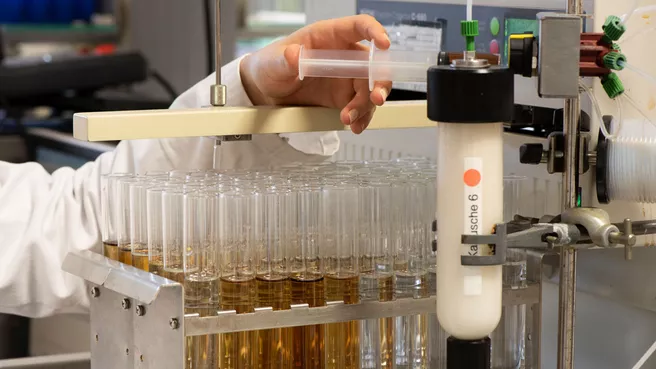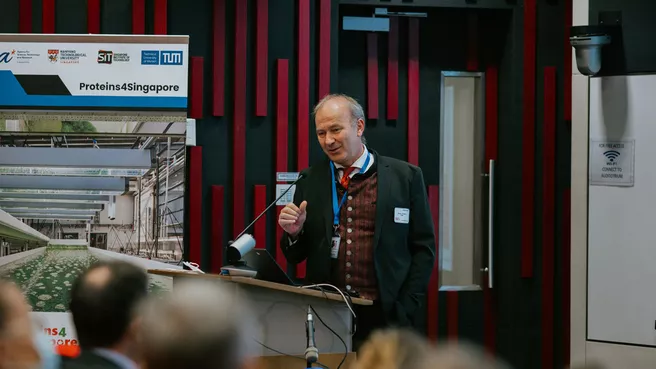„Proteins4Singapore will catalyse the scientific understanding of the relationship between proteins and their structural function and discover more about their aroma, taste, and texture interactions,” says Thomas Becker, Professor of Brewing and Beverage Technology at the TUM School of Life Sciences, who is also Lead-PI of the Proteins4Singapore.
The completion of the research will offer promising solutions to address one of the world's most urgent challenges. “Technologies emerging from this research will also offer new business opportunities in Singapore while strengthening the food supply in Singapore,” those involved in the project agree.
TUMCREATE intensifies research in the field of nutrition
TUMCREATE, a multidisciplinary research platform of the Technical University of Munich (TUM) at the Singapore campus, will lead the scientific research program, Proteins4Singapore, to explore and secure sustainable sources of protein supply for food production in Singapore. Funded by Singapore’s National Research Foundation, the research explores cutting-edge sustainable methods to derive protein sources from conventional side streams and revolutionize the way food is produced traditionally by creating food of highly defined textural, sensory and nutritional qualities.
TUMCREATE's CEO, Prof. Ulf Schlichtmann said, "The Proteins4Singapore research program holds great potential in unlocking clues and accelerating our understanding towards the formation and interactions of proteins while offering life-changing technologies to secure a sustainable protein supply, which will make a difference for people in Singapore and other megacities."
Keeping pace with rising global population
With the world's population tipped to exceed 9.2 billion in 2050, there is an urgent need to provide food to the growing population amid mounting challenges such as climate crisis, ongoing urbanisation, depletion of the agricultural landscape, unexpected and disruptive events such as the COVID-19 pandemic.
Singapore, with only one per cent of the land available for food production, relies heavily on global supply chains for food. In 2020, the nation only produces 10 per cent of its food locally while importing 90 per cent of local food consumption from 170 countries. The inherent vulnerability of its food supply chain and the volatilities the food supply chain is subjected to have consequently urged the nation to push forward with its "30 by 30" plan of producing 30 per cent of Singapore's nutritional needs by 2030.
The United Nations projected that by 2030, there will be 43 megacities exceeding 10 million people, while 68 per cent of the 10 billion global population will live in urban areas.3F4 Thus, the unique position that Singapore is in will serve as a blueprint for globally relevant scenarios to supply nutritious food to a densely populated but land-limited urban population.
Facilitating a new generation of proteins
At its core, the research will combine alternative protein sources, like micro-algae, protein-rich crops, or side-streams from aquaculture, on indoor farming concepts independent from arable land and climate change. These new protein sources will be integrated into innovative processing methods to facilitate a new generation of proteins. One of them is the use of novel reverse food engineering. This technique breaks down and separates food products into individual components to produce food with pleasant textures and improved sensory impressions - a critical step in creating nutritious and high-quality food products that has yet to be commercialized in the market.
Another is the use of integrative and innovative extrusion systems in combination with 3D printing techniques to lead to large-scale, as well as decentralized production capabilities for plant protein-based foods with highly controlled and defined sensory perception functions. The formation of realistic textures similar to conventionally textured food will greatly improve consumer perception of such novel food products.
Drawing expertise from different disciplines in material science, process engineering and food chemistry, the research will focus on establishing links between protein functionality, proteins’ interactions with other ingredients, sensory qualities, and the inherent processing methods using fundamental and application-based analytic techniques.
About TUMCREATE:
Founded in 2010, TUMCREATE is a multidisciplinary research platform funded by the National Research Foundation to foster bilateral research exchanges between Technical University of Munich (TUM) and relevant partners in Singapore. TUMCREATE collaborates with partner universities, public agencies, and industry for the advancement of future technologies in the fields of electromobility, smart cities, medical technology, and now – food science. Over the last years, the researchers of TUMCREATE have contributed to nearly 700 publications with their results.
More Information:
Harnessing world-class expertise in material science, process engineering and food chemistry from leading academic and research institutions - TUM, Nanyang Technological University (NTU) Singapore, Singapore Institute of Technology (SIT) and Agency for Science, Technology and Research (A*STAR) – the research program propels forward a new generation of proteins that is nutritious and palatable.
This research is supported by the National Research Foundation, Prime Minister’s Office, Singapore under its Campus for Research Excellence and Technological Enterprise (CREATE) programme.
CREATE is an international collaboratory housing research centres set up by top universities. At CREATE, researchers from diverse disciplines and backgrounds work closely together to perform cutting-edge research in strategic areas of interest, for translation into practical applications leading to positive economic and societal outcomes for Singapore. The interdisciplinary research centres at CREATE focus on four areas of interdisciplinary thematic areas of research, namely human systems, energy systems, environmental systems and urban systems. More information on the CREATE programme can be obtained from
Website: https://www.tum-create.edu.sg
Facebook: https://www.facebook.com/TUMCREATE
LinkedIn: https://www.linkedin.com/company/tum-create-limited
Editing:
Dr. Katharina Baumeister
TUM Corporate Communication Center
Press and Public Relations
Scientific Contact:
Prof. Dr.-Ing. Thomas Becker
Chair of Brewing and Beverage Technology
TUM School of Life Sciences
Tel. +49 8161 71 3262
tb(at)tum.de

